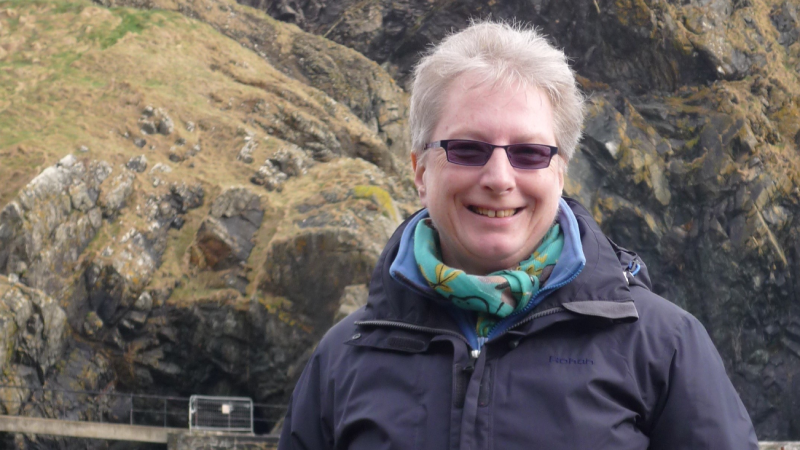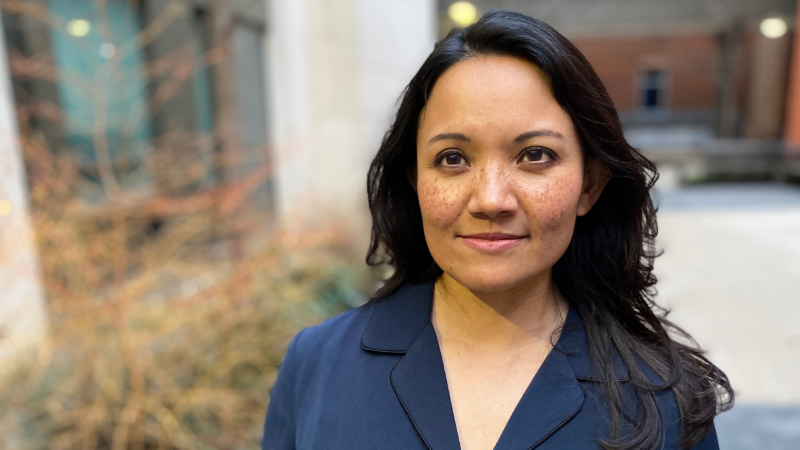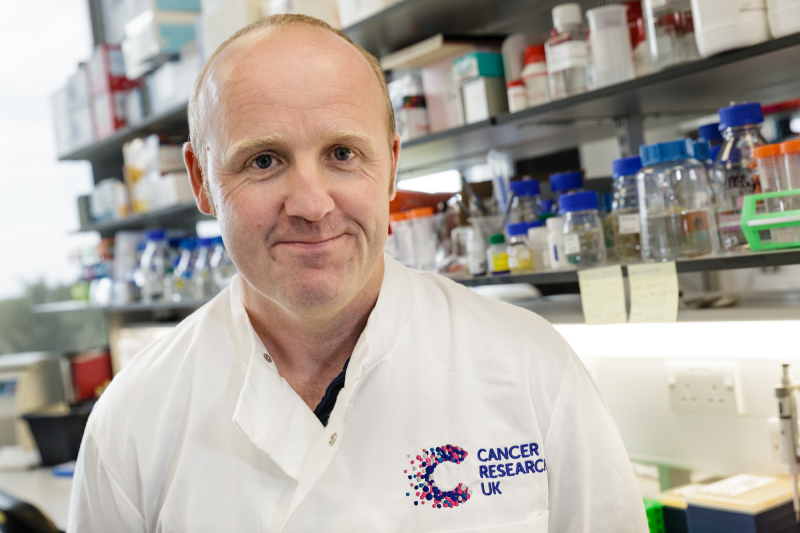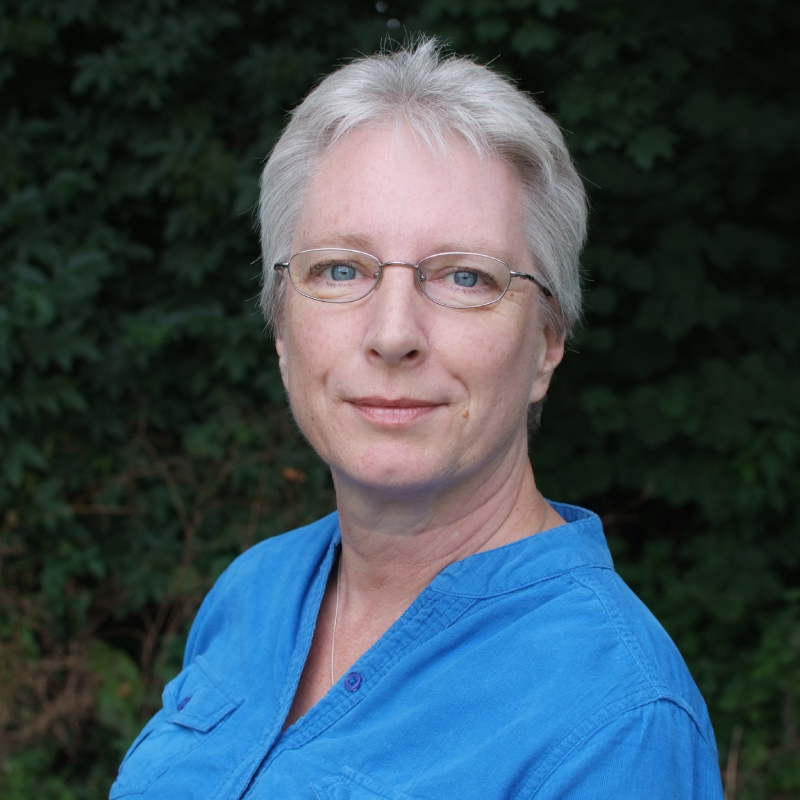An early-stage trial at Addenbrooke’s Hospital, aims to improve treatment for people with late-stage pancreatic cancer, a challenging cancer that is often diagnosed late, when few treatment options are available.
Clinicians at Addenbrooke’s are highlighting the trial on world pancreatic cancer day (20 Nov). Pancreatic cancer is the tenth most common cancer in the UK. Around 10,000 people are diagnosed each year. Of these, at least 40 percent are diagnosed when the cancer has already spread to other parts of the body (stage 4).
The CRISTAL-APC trial (opens in a new tab) is led from Cambridge University Hospitals NHS Foundation Trust (CUH) and the University of Cambridge. It aims to improve treatment for people with stage 4 pancreatic cancer by reducing side effects without reducing efficacy. The trial will combine chemotherapy with a drug known as VP-002.

Improved access to research and clinical trials is one of the many benefits that the planned Cambridge Cancer Research Hospital, set to be built on the Cambridge Biomedical Campus, will bring regionally, nationally and globally.
By bringing together the clinical excellence of Addenbrooke’s Hospital and the scientific expertise of the University of Cambridge under one roof, the specialist facility will accelerate the translation of new cancer innovations into cutting-edge patient care.
"If a treatment like VP-002 can make chemo easier, while still beating cancer, that has got to be a good thing."
Sally Pascall, is a volunteer patient representative who helped to design the CRISTAL-APC trial
The life expectancy for people diagnosed with stage 4 pancreatic cancer is less than a year and, when diagnosed, many people are already too unwell to benefit from existing treatments. Where treatment is possible, the leading option is intensive chemotherapy that often comes with side effects and little, if any, improvements in quality of life.
Chief investigator of the trial, Dr Bristi Basu, hopes that the combination of VP-002 and chemotherapy will be more effective against the cancer, while causing less harm to patients.

"We have so few options available to help people diagnosed with late-stage pancreatic cancer. With CRISTAL-APC, we’ve worked with patients to design a trial that has the potential to give them more time but also a better quality of life. It could make a huge difference for these people and their families."
Dr Bristi Basu, an honorary consultant medical oncologist at CUH and clinical senior research associate in the Department of Oncology, University of Cambridge
VP-002 has been developed based on research performed in Cambridge led by Dr Tony Wu and Dr Michael Gill at the Cancer Research UK Cambridge Institute, University of Cambridge.
As cancers grow, they make changes to their surroundings. These changes help the cancer to keep growing and protect it against treatment. The research in Cambridge showed that a key protein in this process is the CCR1 receptor. VP-002 shuts down the CCR1 receptor, making it harder for the cancer to grow and weakening its defenses.
By using VP-002 to weaken the cancer, doctors hope to be able to use a lower dose of chemotherapy. For patients, this could mean fewer side effects, while still being just as effective at treating cancer.

"CCR1 receptor represents a significant weakness in these cancers that we hope to be able to exploit. Making these hard-to-treat tumours more susceptible to existing therapies could really improve patient outcomes and help more people to live longer."
Dr Michael Gill, senior research associate and office of translation and impact manager at the Cancer Research UK Cambridge Institute, University of Cambridge
In total, the trial aims to include 120 patients across 15 hospitals. It will run in two phases. The first will look at different doses of VP-002 and chemotherapy to identify which is the safest and most effective combination. In the second phase, the combination of chemotherapy plus VP-002 will be compared against the current standard treatment of chemotherapy alone.
If successful, larger studies will be needed to prove whether VP-002 should become a standard treatment for late-stage pancreatic cancer.
Dr Basu, who also co-leads the Pancreatic Cancer Programme at the Cancer Research UK Cambridge Centre, notes that the treatment is not expected to be a cure, but that it could slow disease progression and give people more quality time with their family and friends.
VP-002 is being developed by Cycle Pharmaceuticals, who have also funded the trial. The trial is being run from the National Institute of Health & Care Research (NIHR) Cambridge Clinical Research Facility (CRF) and the NIHR Cambridge Clinical Trials Unit a UK clinical research collaboration (UKCRC) registered academic clinical trials unit.
Sally’s story
Sally Pascall, 68, is a retired physiotherapist from near Newmarket, Suffolk. She has lived with pancreatic cancer for 14 years and helped to design the CRISTAL-APC trial.
Doctors at Addenbrooke’s Hospital first diagnosed Sally with pancreatic cancer in 2011 after she developed jaundice.

"There are times when the cancer gets on top of you, but living with pancreatic cancer teaches you to make the most of every day. Today I am well, and I will enjoy that. I don’t want to be defined by the cancer, I stay active sing in choirs and get out with my friends."
Sally
Since she was diagnosed, Sally has had extensive surgery to remove most of the cancer and been treated with two rounds of chemotherapy, which she recalls as difficult times. During the second round she even had an allergic reaction to one of the drugs.
“Going through chemo is tough and exhausting,” she said, “It comes with all kinds of side effects and you need ways to get through it. I kept telling myself, quarter of the way there, halfway there. If a treatment like VP-002 can make chemo easier, while still beating cancer, that has got to be a good thing.”
While her survival has been called ‘miraculous’ Sally wants to improve the outlook for everyone with pancreatic cancer. She now works with doctors and scientists in Cambridge to improve care for people with pancreatic cancer as a volunteer patient representative with the Cambridge Pancreatic Cancer Programme within the Cancer Research UK Cambridge Centre.
In her role, Sally has worked with Dr Basu and colleagues to design the CRISTAL-APC trial and to make it easier for patients to understand the trial and consent to participate.
"I’m incredibly fortunate to be an exceptional responder to treatment and would love to be just one of many. I sincerely hope this trial will be another step forward in improving both quality of life and survival for patients."
Sally